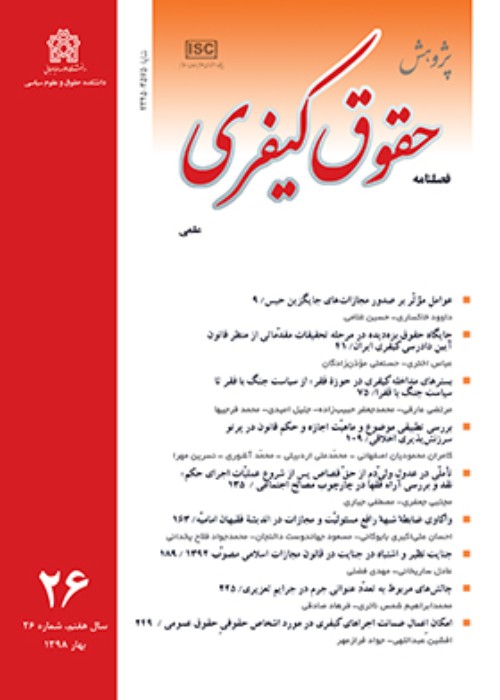The Role of Power in the Process of Criminalization- Penalization
By reflecting on social relations, the footprints of power will be revealed, and in other words, power has a fluid presence in all matters of human life. Human societies have accepted the power of Mehr by establishing a political system for the order of affairs, and by establishing various institutions, they have tried to manage their affairs. By accepting the principle of separation of powers in a society or sovereign territory, the legislative, executive and judicial institutions will work together in harmony, and it is obvious that these institutions will also be affected by the ruling political context. The institution of criminal legislation in every society will explain the legislative policies and determine the normative boundaries and protect the value models of the citizens, and without a doubt, the determination of this value territory is also a function of power considerations, the foundations of which are established in the general policy of the country. The fluid power in the public policy of a country will determine the direction of the criminalization and punishment processes in the context of legislative criminal policy and with this description, the influence of power on the criminalization and punishment processes will be revealed. Power has manifested itself in different forms and on this basis, the degree of influence on various categories in the administration of a society will also be different. Political power, military power, royal power or religious power, media power and other examples, depending on the type and nature of the ruling regime of a society, can affect the legislative framework and the regime of crimes and punishments against illegal behaviors. Therefore, it is reasonable to maintin that the legislative system will be affected by the context of the ruling power. Realizing that power, whether obtained through legitimate means or through force and domination over subordinates, ultimately affects the legislative system and the processes of criminalization and determining punishments, and this issue will be the beginning of a way to another research: how this affects the institutions responsible for determining crimes and punishments will be determined. On this basis, in terms of revealing the new discourse of influence of power in the hidden layers of the legislative policy of the countries, which in the future and in the hands of the governments, will become a power in the direction of controlling and restraining the subjects that make up the discourse of power, the present article has been written in order to present an answer to the important question of "How does power influence the processes of criminalization and punishment?" Undoubtedly, today, with the ever-increasing development of the "government" institution in its many forms, it has made people see more clearly the influence of economic, military powers at the national and international levels. In some cases, the influence of political power in the approval or non-approval of punitive laws is so obvious that the role of expediency can be clearly seen. Expediency in supporting and protecting the interests of a limited number of people or belonging to a specific group causes the approval of laws that are completely contrary to the criterion of "public interest" and makes the color and shape of some laws so clear that other than protection. It does not serve any purpose of special group interests. It should not be forgotten that in such cases, the law is passed in the name of protecting the interests of the general public of a society. In many cases, it can be seen that in authoritarian government systems, the people are not at all aware of the mass of approved laws, and the people's representatives are also under the direct influence of economic, military, and media power, etc.The question of "How does power affect the processes of criminalization and punishment?" is a question that needs to be analyzed due to the lack of research writings in the scientific bases of the country, and we have tried to understand its hidden layers with an analytical-descriptive method and using theoretical sources. In this regard, uncovering the role of power in the process of criminalization and that the system of crimes and punishments determined for them is itself a function of the foundations of the ruling power, is considered the achievement of the article, because it puts a seal of approval on the fact that; the type and even the amount of crimes are based on the ruling powers and their beliefs, and therefore, it is not always the case that the interest of the individual is the basis of criminalization, and the appeal to the concept of protection of the "public good" is itself a sign of the superiority of political power and its obvious influence in determining the system of crimes and punishments. In other words, in many cases, the political governments of countries act through the system of criminalization-punishment to maintain their power and in this way keep the citizens in the center of power.
- حق عضویت دریافتی صرف حمایت از نشریات عضو و نگهداری، تکمیل و توسعه مگیران میشود.
- پرداخت حق اشتراک و دانلود مقالات اجازه بازنشر آن در سایر رسانههای چاپی و دیجیتال را به کاربر نمیدهد.


